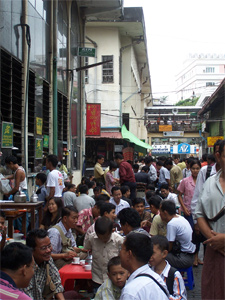Semester at
Sea Fall
2006 Voyage 
- Home
Sweet Home
- Amy DeWitt, by Amy DeWitt
- "Meandering" Comparative Migration Project
- Japan: Large-Breasted
Migration
- Hong Kong: A Coagulation of
Migratory Beauty
- Burma:
Full Length,
Feature-Film Migration
- Egypt: "Fil Mish Mish"
- Turkey: Where have all the
Muslims Gone?
- Spain: Migration is an Olive
Offer
- Open Letter
Full Length, Feature-Film
Migration

“
My comrades could not go without a taste of Johnny Depp causing us to straggle into the building masked in a giant poster for Pirates of the Caribbean: Deadman’s Chest. We waited with the masses of families and couples and groups of young friends in the lobby eating ice cream until finally herded toward the mandatory metal detector. We were successful, only after emptying our pockets, leaving our purses, and removing our shoes and belts. High security for a social event. Baaing with the rest of the sheep, we ascended two flights of stairs, showed the man with the flashlight our tickets and were guided to our balcony seats.
The show
started
with a Broadway-style opening of the deep red, velvet curtains. Then the screen flashed with the same dancing
popcorn and soda, hand in hand and smiling, as in the
What does
that
mean? Was it an order, or simply a
disclaimer to all of the non-Burmese that it wasn’t necessary to pay
respects? I definitely felt demanded; I
was compelled to stand and place a hand over my heart to a country
sanctioned
by the
When the movie finally began, the crowd only got louder, rustling bags of snacks, talking on cell phones, forgetting about their “inside voices.” The movie was in English – to be expected, without Burmese subtitles – not to be expected. This massive theater was teeming with non-English ears, and they all attended with no intent of understanding the dialogue. On top of a failing sound system, it was nearly impossible for our English ears to hear what was going on. This crowd was clearly a selection of Burmese higher class; was a weekly visit to an American movie a demonstration of class? Is the American ideal strong enough to create a desire for American media even without an understanding? Or maybe I was wrong entirely:
The theater
was a
collective gathering of downright noisy. Captain
Jack Sparrow continued to spout out skewed
English, untranslatable
even if there had been subtitles. And
yet, somehow through the racket, the theater would belt out into
roaring
laughter at all the appropriate moments. It
was interesting to note the differences in emotions.
While it was always a united expression, what
they found humorous was different than what the three of us giggled at. There were joint gasps at parts that weren’t
meant to inflict fear and on-cue sighs of relief after random scenes. Their lack of understanding on a word-by-word
basis was irrelevant; they had formulated their own understanding using
what is
known (the Burmese culture)  and
what is speculated (the American). This
was a subconscious understanding, as if
they had gathered together prior to the flick to discuss when and what would
be
funny, sad, exciting, scary…
and
what is speculated (the American). This
was a subconscious understanding, as if
they had gathered together prior to the flick to discuss when and what would
be
funny, sad, exciting, scary…